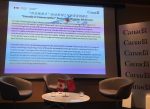The event
One more in the series Canada in Conversation with Minister Catherine McKenna, in charge of Environment and Climate Change.
Chargé d’Affaires Cindy Termorshuizen was the host on 6 December in the Canadian Embassy in Beijing and introduced the importance of investing in clean technologies to tackle climate change and to meet their Paris Summit commitments.
A number of Canadian companies active in clean technologies were present.
Another highlight: Canadians are gearing up for the 150th anniversary of Confederation and are invited to take part in the year-long celebration, as shown in the video that also featured Canada’s national parks.
The program
After the introduction by the Chargé d’Affaires, Ms. Catherine McKenna delivered a keynote address and then participated in a conversation with Mr. Chai Fahe. The talk was moderated by Ms. Wu Changhua.
A networking reception followed the panel discussion at the Official Residence.
Canada’s clean technology industry is one of the country’s most promising of the 21st Century. It operates across 10 sectors, and the “clean tech” term encompasses companies finding green solutions to everything from energy efficiency to renewable energy, from waste management to green transportation, and from biofuels to greener solutions for the oil and gas industry. Canada’s clean tech sector is highly competitive and an innovation-led industry, committed to investing heavily in research and development and serving international markets. Indeed, Canadian clean tech has a key role to play in the global race to address climate change and helping Canada and other countries to meet their Paris Summit commitments.
Canada’s clean tech capabilities is said to present terrific potential for Canada-China cooperation in a range of areas, including using energy more efficiently, renewable power generation, smart grid distribution, nuclear energy, hydrogen fuel cell technology, and carbon capture and storage.
The speakers
Catherine McKenna, Minister of Environment and Climate Change, practiced competition and international trade law in Canada and Indonesia and was senior negotiator with the United Nations Peacekeeping Mission in East Timor. She also served as senior advisor on the former Chief Justice Antonio Lamer’s review of Canada’s military justice system. Ms. McKenna co-founded Canadian Lawyers Abroad, a charitable organization that works in developing countries and with Indigenous communities in Canada. She served as Executive Director of the Banff Forum, a public policy organization for young leaders. Ms. McKenna taught at the Munk School of Global Affairs. Ms. McKenna was elected in October 2015 and appointed Minister of Environment and Climate Change in November 2015.
Mr. Chai Fahe is Vice President of Chinese Research Academy of Environmental Sciences.
Ms. Wu Changhua chairs the China Redesign Hub and acts as the China/Asia Region Liaison for Jeremy Rifkin Office. She is a leading Chinese policy expert in sustainable development, climate change, environmental protection, green financing, and technology innovation. She worked with former UK Prime Minister Tony Blair on Breaking the Climate Deadlock project for the Copenhagen process, chaired the Global Agenda Council on Climate Change at the World Economic Forum, and served on the UNFCCC Clean Development Mechanism Committee and the Carbon Market Leadership Policy Dialogue. She has chaired two boards of The Climate Group in Greater China and acted as the Group’s Director to advance China’s low carbon economy. She holds a Master in Law from the Chinese Academy of Social Sciences’ School of Journalism and an MA in environmental policy and management from the University Maryland.
Highlights of the discussion
Canada will invest a large sum for further innovation and action in clean energy in the next four years.
Technologies highlighted by the Canadian side are geothermal energy, hydrogen fuel cells and more.
Mr. Chai very well described the challenges China faces in this respect, such as the need for a more stable and balanced electric network with smart grid and energy storage, to eliminate the conflict between the irregular power supply from renewables such as wind and solar and the demand from consumers.
He also agreed that lithium cell technology was not sufficient to deal with it.
I raised two questions: what technologies China looks at for energy storage and how to deal with the waste of heating in Chinese building due to a lack of proper monitoring and regulation of the supply.
Next year China is to start the national carbon trade market.







